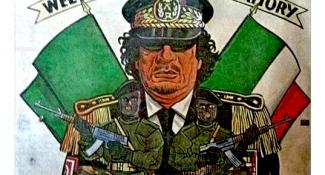Libya and Terrorism: An Enigma Wrapped in Mystery? Part-II
Tryst with Modern Jihadi Terrorism: By the mid-nineties, Libya was faced with a peculiar situation. The Gaddafi regime, which had successfully masterminded several acts of terrorism outside its soil, was now the target of radical elements within its territory. The veterans of the Afghan war included several thousand Libyans, some of whom returned to Libya to form the Libyan Islamic Fighting group (LIFG), with the aim to overthrow Gaddafi and establish an Islamic state based on Shariah laws. Gaddafi survived two assassination attempts by the LIFG in the 90s and launched a massive crackdown against the LIFG members. Other radical groups waging a jihad against Gaddafi include the Islamic Movement of Martyrs, the Libyan Jihad Movement and the Islamic Movement for Change. All these organisations reportedly have a substantial following in Libya that can, shortly, be a serious threat to the Gaddafi regime.
Al Qaeda has made steady inroads into Libya, and some of the top Al Qaeda leaders are Libyans. In 2004, there were reports of Al Qaeda camps discovered in the southern desert of Libya, near the border with Chad. These camps are being used by Al Qaeda and affiliated organisations like the Algeria-based Salafist Group for Preaching and Combat (SGPC). There were increasing reports in 2004 about Al Qaeda and its allies shifting base to the Sahara and North Africa after the US war on Afghanistan.
Libya and the Global War on Terror: The events of 9/11 (2001) provided an opportunity for Gaddafi to seek international legitimacy for the crackdown against the Islamic radicals within his territory. Gaddafi chose to side with the West, and since then, relations between the West and Libya have been steadily improving. While still critical of America’s policies and the war in Iraq, Gaddafi’s regime has been exchanging intelligence about the Al Qaeda network with the United States. It has, since 2003, arrested several Al Qaeda members. Gaddafi himself has, on several occasions, spoken against fundamentalism and Osama bin Laden and his allies. In 2003, Libya also denounced its WMD programme, much to the relief of the Western powers, resulting in the lifting of commercial restrictions and sanctions imposed by the UN, the US and the EU.
The Libyan regime has benefited immensely by signing on to the ‘war on terror’. In September 2001, President Bush signed an executive order freezing the assets of the LIFG in the US on the claims that the group was planning attacks on America. In December 2001, the LIFG was added to the terrorism exclusion list, and in December 2004, the US designated the LIFG as a foreign terrorist organisation. After Libya agreed to pay compensation to the families of the victims of the 1986 Berlin bombing, last year in 2004, the German government said it would help Libya in modernising its economy.
Conclusions
Gaddafi’s rapprochement with the West remains a mystery for Libya watchers. Has the ‘master terrorist’ undergone a severe change of heart and intentions, or are there political compulsions driving his efforts? Is it merely an attempt to escape economic isolation inflicted by sanctions and attract commercial business, foreign investment and trade? Or is it his genuine fear being reflected in the classic case of the hunter being hunted? Is it a man desperate to hold on to power otherwise threatened by modern jihadi terrorism? Answers to these questions can never be accurate, but there is an underlying fact behind them that cannot go unnoticed. Libya is yet another country in the Islamic world, hostage to the personality cult of the longest-serving dictator in the region.
Libya is one of the richest states in North Africa, with the potential for greater economic development and prosperity for its people. It can also be a leading player in the Middle East Peace Process. But as long as its policies are solely guided by the whims of one man, the Al Libbys will continue to lurk in the dark, making a mockery of international cooperation in the ‘war on terror’.
Read, Libya and Terrorism: An Enigma Wrapped in Mystery? Part-I
